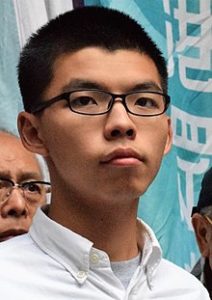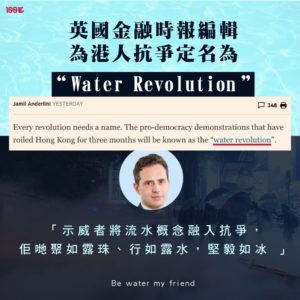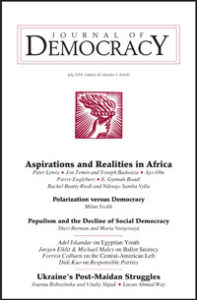Hong Kong activists urged Taiwan on Tuesday to help promote democracy in the Chinese-ruled city amid its worst political crisis in decades and called for a mass rally before the 70th anniversary of the founding of Communist China on Oct. 1, Reuters reports:
Hong Kong, a former British colony, returned to Chinese rule in 1997 under a “one country, two systems” formula guaranteeing its freedoms. China has suggested the same formula for Taiwan, which it considers an unruly, breakaway province. Many in Taiwan have been closely watching Hong Kong and become increasingly wary of Beijing’s “reunification” agenda.
“I hope people can brainstorm together on how to win this war against Beijing’s white terror and authoritarian rule,” said Lester Shum, one of the student leaders of Hong Kong’s pro-democracy “Umbrella” movement five years ago that foreshadowed the current unrest.
“Friends in Taiwan are not bystanders of the movement in Hong Kong. Taiwanese are participants,” he said. “China will definitely want to take over Taiwan after it takes over Hong Kong.”

Wikipedia
“Hong Kong is just similar as East Berlin in the last century under authoritarian rule,” argues democracy advocate Joshua Wong (right). “Now is the time for us to fight back. Let the world know that we are the ones standing in the forefront to confront Beijing suppression,” he tells ABC reporter Sophie McNeill in a must-view report (above).
“We’re seeing more and more violence being used, we’re seeing these threats of intervention from Beijing, it’s really, really hard to see any way out,” adds author and journalist Louisa Lim. “I think for Hong Kongers this, all of this is unimaginable. Nobody thought that we would now be in this kind of situation where there’s basically pitched battles on the street every, every weekend. It’s inexplicable.”
![]() Hong Kong’s rapidly evolving ‘Water Revolution’ is spiraling out of control, adds FT analyst Jamil Anderlini (below). The romance of this revolution and the depth of support it enjoys cannot be fully appreciated until you have spoken to young people who attend each protest with their last will and testament in their pockets or left on laptops in their parents’ home, he contends:
Hong Kong’s rapidly evolving ‘Water Revolution’ is spiraling out of control, adds FT analyst Jamil Anderlini (below). The romance of this revolution and the depth of support it enjoys cannot be fully appreciated until you have spoken to young people who attend each protest with their last will and testament in their pockets or left on laptops in their parents’ home, he contends:

It is very hard to imagine they will quietly return to class any time soon and it is equally easy to imagine the movement morphing into a genuine armed insurgency. …. If Beijing continues with its ultra-hardline approach, it is possible Hong Kong will descend into a situation resembling the Northern Irish “Troubles” of the 1970s and 1980s. That would mark the end of the city as a global financial centre. But it would not end the water revolution, which could easily spill across the border into mainland China, as IRA attacks did in the UK.
With the arrests in Hong Kong of the youthful pro-democracy activists Wong and Agnes Chow, a harsh crackdown by Beijing on the popular movement seems increasingly likely, notes Stanford University’s Larry Diamond.
![]()
 The current movement lacks the clear leadership and organization of the 2014 Umbrella Movement (in part to avoid leaving leaders as clear targets for persecution), he writes for The American Interest.
The current movement lacks the clear leadership and organization of the 2014 Umbrella Movement (in part to avoid leaving leaders as clear targets for persecution), he writes for The American Interest.
The crisis could have been de-escalated many weeks ago if Hong Kong’s stubborn and politically inept Chief Executive, Carrie Lam—who owes her loyalty to the Communist Party bosses in Beijing and not to her own people—had offered to negotiate with representatives of the pro-democracy movement, adds Diamond, co-editor of the NED’s Journal of Democracy:
There may not be much time left to avert a tragedy. The United States, the UK, and other leading democracies must make clear to China’s leaders (particularly through private channels) that violent repression in Hong Kong will bring severe and long-lasting consequences. At a minimum, we should use the Global Magnitsky Act to impose targeted sanctions…..Beijing’s leaders must know that a violent crackdown in Hong Kong would obstruct any possibility of a return to a more normal relationship with Western democracies. And we must prepare now to wage and win a battle for global public opinion to make the PRC pay a very heavy price in esteem should it use force to suppress peaceful protestors in Hong Kong.
At the same time, in the dwindling time that may be left, we should reach out to diverse elements of the pro-democracy movement in Hong Kong, urging strict adherence to non-violence and a willingness to negotiate and compromise, he suggests. RTWT







